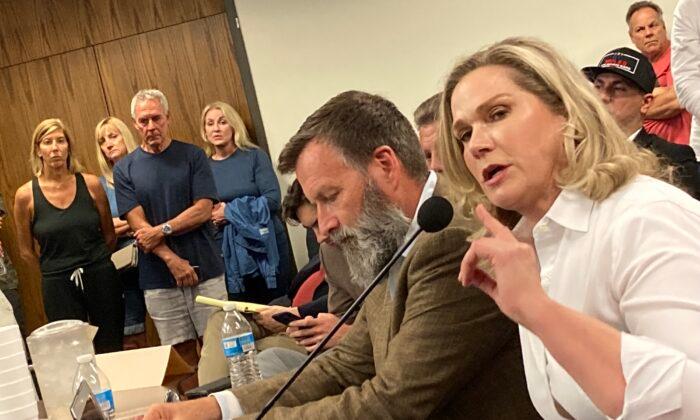A federal judge finds after a non-jury trial that election watchdogs making voter registration challenges did not violate the Voting Rights Act.
 True the Vote founder and president Catherine Engelbrecht makes a point during a presentation on ballot trafficking at the Arizona statehouse on May 31. Seated next to her is True the Vote data investigator Gregg Phillips.
True the Vote founder and president Catherine Engelbrecht makes a point during a presentation on ballot trafficking at the Arizona statehouse on May 31. Seated next to her is True the Vote data investigator Gregg Phillips.The conservative vote-monitoring organization True the Vote’s challenges to Georgia voters’ eligibility did not amount to voter intimidation in the 2020 elections, a federal judge ruled on Jan. 2.
U.S. District Judge Steve C. Jones, in a 145-page ruling issued a little less than two months after the end of a civil trial, found that the defendants thus did not violate the Voting Rights Act.
Texas-based True the Vote, its founder Catherine Engelbrecht, and several others had raised questions about whether 364,000 Georgia voters were improperly registered because their voter registrations conflicted with their mailing addresses.
The runoff elections contributed to the charged atmosphere leading up to the Electoral College vote in Washington on Jan. 6, 2021, when thousands of President Donald Trump supporters marched in protest. The march turned into a breach of the U.S. Capitol, which congressional Democrats have since sought to characterize as an “insurrection.”
Fair Fight Inc., a group formed by former Georgia gubernatorial candidate Stacey Abrams, sued on behalf of several plaintiffs. The two groups battled it out for seven days, ending in early November in a non-jury trial in Jones’s courtroom in Gainesville, Georgia.
Aside from Ms. Engelbrecht, the defendants included two data analysts, Mark Davis and Derek Somerville, mailing list printer Mark Williams, and two others, Ron Johnson and James Cooper.
Judge Jones expressed some reservations in his decision.
“Having heard the evidence presented and the arguments made by the Parties, the Court maintains its prior concerns about the manner Defendants utilized (Georgia law) to challenge individual voters. The Court, however, ultimately concludes that, as a legal matter, Plaintiffs have not carried their burden to show a violation of Section 11(b) (of the Voting Rights Act.) Accordingly, the Court enters judgment in favor (of) Defendants.
“There is no evidence that Defendants attempted to make any of the voters in this case feel timid or fearful, or that they experienced any actual reasonable intimidation,” the judge wrote in his opinion.
True the Vote’s advertising, podcasts, and press releases about the challenges, he wrote, were not intimidating in the way that direct calls to their telephone numbers would be.
Cameron Powell, one of the defense attorneys, told The Epoch Times in an email he was on vacation and had not had a chance to read the decision. He said earlier, though, that whatever the verdict, he thought an appeal was likely.
https://www.theepochtimes.com/us/true-the-vote-wins-federal-election-lawsuit-in-georgia-5556981


No comments:
Post a Comment